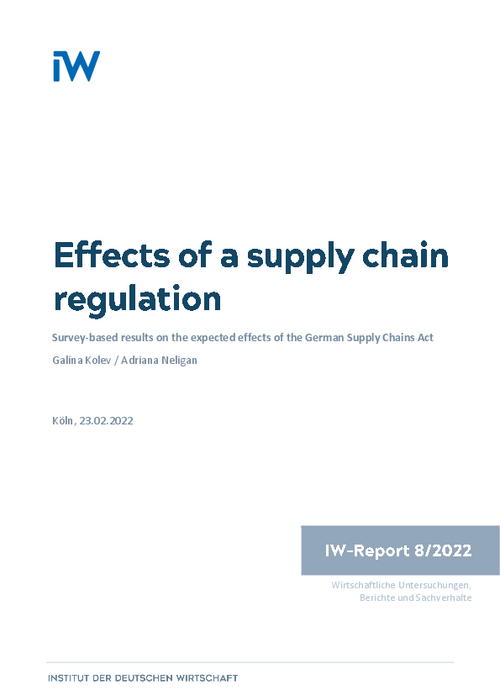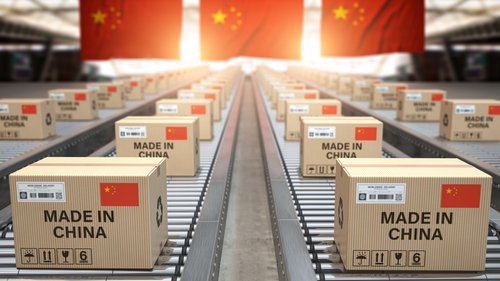The European Commission is planning a new regulation for mandatory human rights and environmental due diligence (Due Diligence Directive) as part of the Sustainable Corporate Governance initiative. The long-awaited EU proposal is expected to have requirements that go far beyond the German Act on Due Diligence in Supply Chains (the so-called Lieferkettensorgfaltspflichtengesetz), which was regarded as a possible blueprint for a European solution. The present paper contributes to the debate on an EU due diligence regulation by presenting results of a recent survey conducted by the German Economic Institute (IW) on the potential impact of the already adopted German Act on Due Diligence in Supply Chains.

Effects of a supply chain regulation: Survey-based results on the expected effects of the German Supply Chains Act

The European Commission is planning a new regulation for mandatory human rights and environmental due diligence (Due Diligence Directive) as part of the Sustainable Corporate Governance initiative. The long-awaited EU proposal is expected to have requirements that go far beyond the German Act on Due Diligence in Supply Chains (the so-called Lieferkettensorgfaltspflichtengesetz), which was regarded as a possible blueprint for a European solution. The present paper contributes to the debate on an EU due diligence regulation by presenting results of a recent survey conducted by the German Economic Institute (IW) on the potential impact of the already adopted German Act on Due Diligence in Supply Chains.
It highlights both the positive effects and the undesirable side effects in the form of adjustments to value chains, product prices, etc. that German companies expect from the introduction of this German regula-tion. The results from the survey indicate that the introduction of a due diligence regulation is costly and should also consider the expected negative effects. The high costs of compliance are likely to motivate many companies to withdraw their activity from (mostly developing) countries with weak governance with devastating consequences for the jobs they created in the past, the production standards they brought and the capital they invested. Therefore, the new EU regulation should be carefully introduced and only target companies where evidence is available about misuse of weak production standards in third countries. It is important that the level of regulation by no means is higher than the level of regula-tion by the German Act on Due Diligence in Supply Chains.
The three main results from the survey are:
- Affectedness by the new German regulation: Almost 41 percent of the companies surveyed say they are directly or indirectly affected by the law, the share being almost as high among small enterprises and substantially higher among large and internationalized enterprises. Another 20 percent cannot yet assess whether they are affected by the law or not.
- Plans to adapt to the new legislation: Nearly 8 percent of the companies surveyed plan to stop sup-plying companies affected by the law. About 12 percent plan to leave countries with weak govern-ance structures (primarily developing and emerging countries) because of the new regulations, and 18 percent plan to source upstream products only from countries that respect human rights and envi-ronmental protection standards. One in five companies from the survey intends to raise the prices of its own products to finance the additional costs of complying with the law. Additional staff for the up-coming monitoring is planned by only 2 percent of the companies surveyed, while 8 percent intend to hire external service providers for this purpose. Only 16 percent of the companies surveyed say they do not intend to take any further measures to adapt to the law, as they already comply with its re-quirements.
- Evaluation of the new legislation: Overall, 25 percent of the companies fully support the introduction of the law, further 24 percent rather support it. Around 27 percent of companies are convinced of a corresponding regulation at EU level. For 25 percent the same is “rather applicable”. However, only just under 12 percent of the companies surveyed feel somewhat or very well-informed by the federal government – for 46 percent of the companies surveyed the information is totally or rather insuffi-cient. Only one in five companies believes that compliance with the law will make its products more attractive to customers. Most companies do not share the view that they will lose competitiveness due to the law. Nevertheless, more than four in ten companies expect higher costs resulting from the implementation of the law, and only 13 percent of the companies surveyed believe that their cus-tomers will be willing to bear the additional costs of implementing the law. For 16 percent of compa-nies, it will be difficult to replace suppliers from problem countries.

Effects of a supply chain regulation: Survey-based results on the expected effects of the German Supply Chains Act

More on the topic

Competitive pressure from China for German companies
A firm survey conducted in March/April 2024 as part of the IW-Zukunftspanel among around 900 German companies from the manufacturing and industrial services sectors shows that around 350 of the companies surveyed have Chinese competitors in their markets.
IW
Strategic autonomy and economic security achieve efficiently
In this study an analytical scheme is developed to operationalise the objective of strategic autonomy in a cost-effective way.
IW